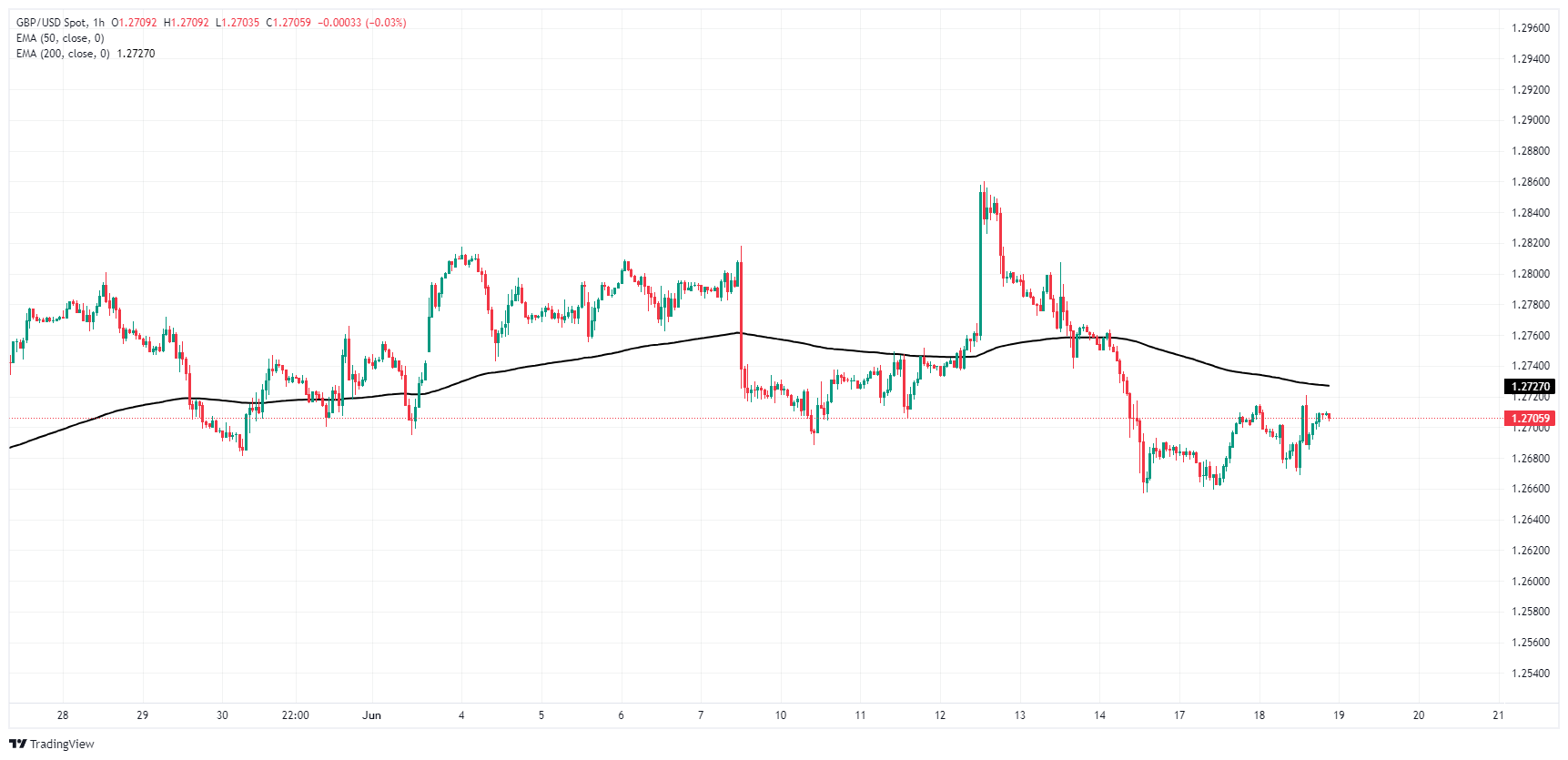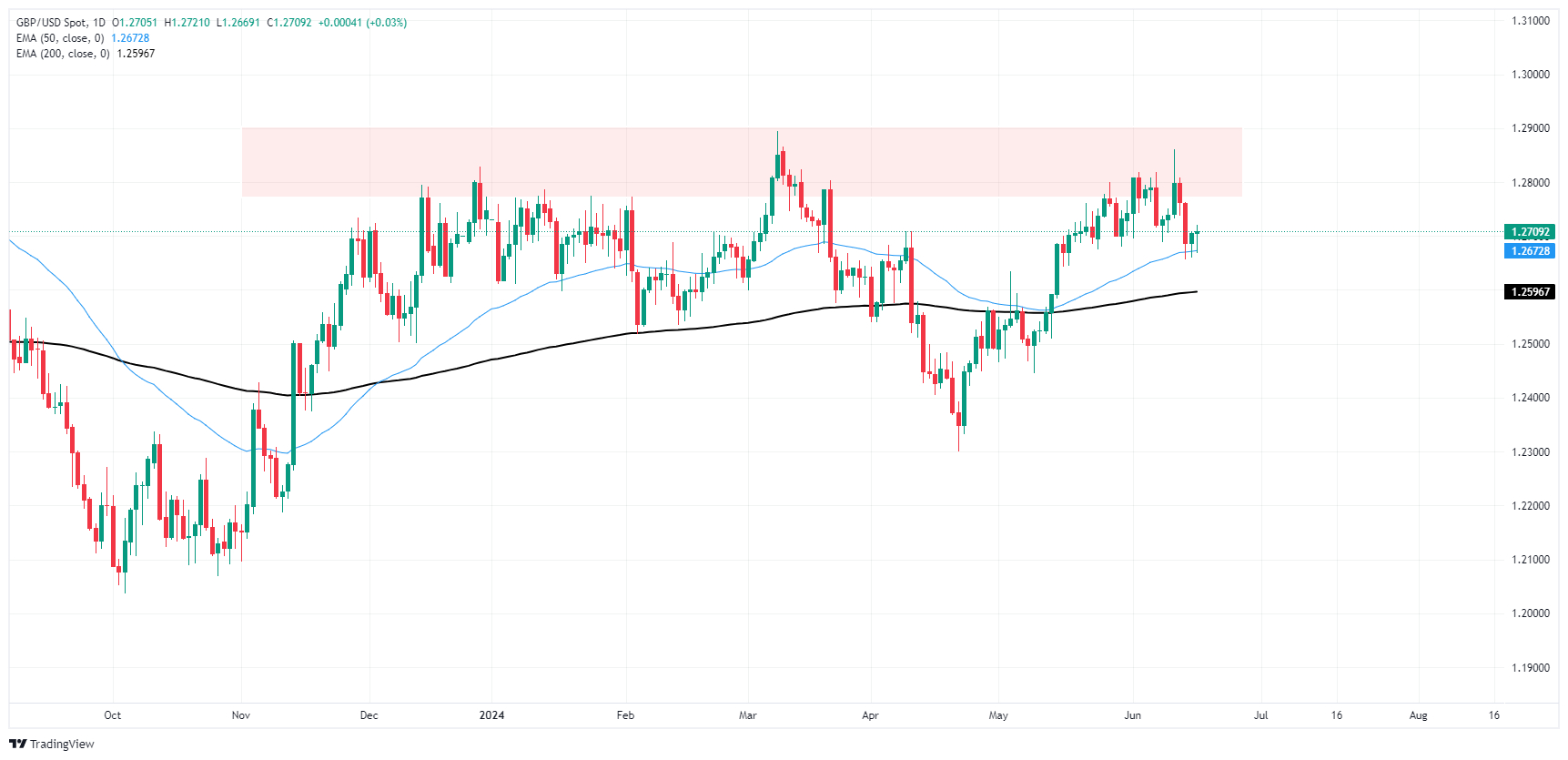- Analytics
- News and Tools
- Market News
- GBP/USD gears up for fresh UK CPI inflation print
GBP/USD gears up for fresh UK CPI inflation print
- GBP/USD cycling 1.2700 as markets get ready for UK CPI inflation update.
- US holiday to leave Wednesday markets thin.
- BoE rate call looms ahead on Thursday, another rate hold is expected.
GBP/USD is churning around the 1.2700 handle as markets gear up for a lopsided Wednesday market session with a US holiday session on the cards and a fresh update on UK Consumer Price Index (CPI) inflation on the docket. Another rate call from the Bank of England (BoE) looms ahead later in the week, followed by a packed economic calendar on Friday with UK Retail Sales, UK Purchasing Managers Index (PMI), and US PMIs to round out the trading week.
Forex Today: Markets’ attention crosses the Channel
Market sentiment was broadly pinned into the midrange on Tuesday, with a flurry of appearances from Federal Reserve (Fed) officials hammering home the Fed’s cautious stance as policymakers continue to wait for further evidence of cooling inflation before making a decision on interest rates.
Federal Reserve officials lean into cautious stance as policymakers wait for further signs of easing
UK CPI inflation is expected to tick higher MoM in May, forecast to print at 0.4% versus the previous 0.3%. Meanwhile, annualized UK CPI inflation is still forecast to ease to 3.5% YoY versus the previous 3.9%. A US market holiday will leave a hole in Wednesday’s market flows with US institutions darkened in observance of the Juneteenth holiday.
The BoE is rounding the corner with a fresh rate call slated for Thursday. Markets are broadly expecting the UK’s central bank to keep rates on hold at 5.25%, with seven Monetary Policy Committee (MPC) members expected to vote to keep rates on hold for the time being. Two MPC members are expected to vote in favor of a quarter-point rate cut, in line with the previous meeting’s voting outcome.
Friday will wrap up the trading week with a hectic economic calendar, with UK Retail Sales, UK PMIs, and US PMIs plugging the chute. UK Retail Sales are forecast to recover to 1.5% MoM in May compared to the previous month’s -2.3% decline.
Friday’s UK Manufacturing PMI is expected to print slightly lower at 51.0 versus the previous 51.2, while the UK Services PMI component is forecast to tick up slightly to 53.0 from 52.9. On the US side, the Manufacturing and Services components are both expected to recede, with the Manufacturing component forecast to tick down to 51.0 from 51.3 and the Services PMI expected to decline to 53.3 from 54.8.
GBP/USD technical outlook
Rough consolidation has marred near-term technicals on GBP/USD, and the pair is trapped just beneath the 200-hour Exponential Moving Average (EMA) at 1.2727. Momentum has stalled out after the Cable etched in a near-term high near 1.2860 last week.
Daily candlesticks are clattering against technical support at the 50-day EMA at 1.2673, keeping the pair bolstered above the 200-day EMA near 1.2597. A heavy supply zone is weighing on bullish momentum above 1.2800, and a break in bullish pressure may drag the pair back to the year’s lows near 1.2300.
GBP/USD hourly chart
GBP/USD daily chart
Pound Sterling FAQs
The Pound Sterling (GBP) is the oldest currency in the world (886 AD) and the official currency of the United Kingdom. It is the fourth most traded unit for foreign exchange (FX) in the world, accounting for 12% of all transactions, averaging $630 billion a day, according to 2022 data. Its key trading pairs are GBP/USD, aka ‘Cable’, which accounts for 11% of FX, GBP/JPY, or the ‘Dragon’ as it is known by traders (3%), and EUR/GBP (2%). The Pound Sterling is issued by the Bank of England (BoE).
The single most important factor influencing the value of the Pound Sterling is monetary policy decided by the Bank of England. The BoE bases its decisions on whether it has achieved its primary goal of “price stability” – a steady inflation rate of around 2%. Its primary tool for achieving this is the adjustment of interest rates. When inflation is too high, the BoE will try to rein it in by raising interest rates, making it more expensive for people and businesses to access credit. This is generally positive for GBP, as higher interest rates make the UK a more attractive place for global investors to park their money. When inflation falls too low it is a sign economic growth is slowing. In this scenario, the BoE will consider lowering interest rates to cheapen credit so businesses will borrow more to invest in growth-generating projects.
Data releases gauge the health of the economy and can impact the value of the Pound Sterling. Indicators such as GDP, Manufacturing and Services PMIs, and employment can all influence the direction of the GBP. A strong economy is good for Sterling. Not only does it attract more foreign investment but it may encourage the BoE to put up interest rates, which will directly strengthen GBP. Otherwise, if economic data is weak, the Pound Sterling is likely to fall.
Another significant data release for the Pound Sterling is the Trade Balance. This indicator measures the difference between what a country earns from its exports and what it spends on imports over a given period. If a country produces highly sought-after exports, its currency will benefit purely from the extra demand created from foreign buyers seeking to purchase these goods. Therefore, a positive net Trade Balance strengthens a currency and vice versa for a negative balance.
© 2000-2026. All rights reserved.
This site is managed by Teletrade D.J. LLC 2351 LLC 2022 (Euro House, Richmond Hill Road, Kingstown, VC0100, St. Vincent and the Grenadines).
The information on this website is for informational purposes only and does not constitute any investment advice.
The company does not serve or provide services to customers who are residents of the US, Canada, Iran, The Democratic People's Republic of Korea, Yemen and FATF blacklisted countries.
Making transactions on financial markets with marginal financial instruments opens up wide possibilities and allows investors who are willing to take risks to earn high profits, carrying a potentially high risk of losses at the same time. Therefore you should responsibly approach the issue of choosing the appropriate investment strategy, taking the available resources into account, before starting trading.
Use of the information: full or partial use of materials from this website must always be referenced to TeleTrade as the source of information. Use of the materials on the Internet must be accompanied by a hyperlink to teletrade.org. Automatic import of materials and information from this website is prohibited.
Please contact our PR department if you have any questions or need assistance at pr@teletrade.global.















